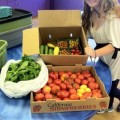 “This is my rutabaga…It’s very special to me…” this pronouncement from 7 year-old Joe, one of my 2nd grade boys, made in the usual trailing interrogatory prosody of “sharing time,” our version of show-and-tell. The typical array of items carried carefully into school by the hands of doting parents or shoved in the bottom of backpacks ranges from trophies and vacation pictures and art projects to more exotic artifacts like Purple Hearts and signed first-edition novels and even once a gavel that belonged to Oliver Wendall Holmes. Whatever the kids show it comes with the proprietary caveat that it is very special, so hands off! But this one caught my attention and made me smile. A rutabaga? Seriously?
“This is my rutabaga…It’s very special to me…” this pronouncement from 7 year-old Joe, one of my 2nd grade boys, made in the usual trailing interrogatory prosody of “sharing time,” our version of show-and-tell. The typical array of items carried carefully into school by the hands of doting parents or shoved in the bottom of backpacks ranges from trophies and vacation pictures and art projects to more exotic artifacts like Purple Hearts and signed first-edition novels and even once a gavel that belonged to Oliver Wendall Holmes. Whatever the kids show it comes with the proprietary caveat that it is very special, so hands off! But this one caught my attention and made me smile. A rutabaga? Seriously?
As Joe held his rutabaga, clutching it protectively to his heart like a wounded bird, I began my customary prompts to elicit information beyond ownership and special-ness. “Did you grow that yourself, Joe?” He had indeed. It seemed his mother had an extensive garden, of which Joe and his brother were given a small parcel to grow their own choice of vegetables. Joe had chosen rutabagas (because he liked the word “rutabaga”- who doesn’t?) and carrots, his brother green beans and lettuce.
The next thing that happens after someone “shares” anything: the stories from other kids about how they either do or do not have something similar. Or they sit in uninterested silence poking the kid next to them or asking when we’ll be done. I was expecting the latter. I was amazed by the number of kids who were, or whose parents were, avid gardeners. “I have pumpkins and acorn squash!; I have carrots!; We have tomatoes in pots on our porch!”
In the following days, kids brought in an assortment of vegetables: carrots, beets, lettuce, onions, cucumbers, parsnips. My students know I’m vegan and so they were curious about which vegetables I prefer, if there are any I don’t like. I have my preferences but I kept them to myself as I knew the kids would take it personally- a kind of “love me, love my rutabaga” snare. “I love all vegetables, because they’re all so good for me,” I declared. When that was not good enough for the kids, I was pressed into admitting (and not having seen any among the cornucopia amassing on our “sharing” table) “kale. I love kale. Kale chips. Kale salad. Kale-slaw. Kale casserole. Any which way you kale!”
The next day, as I should’ve predicted, brought an avalanche of kale. It was Friday. “What are we going to do with all these beautiful vegetables?” I asked in the usual teacher-ly and Socratic way, both prompting contemplation from my students and buying me time to figure it out myself: cook them, compost them, send them home? “We could cook them and eat them!” was the overwhelming consensus. “Yeah!; Yummy!; Eat them! Eat them! Eat them!” All of a sudden they were a voracious hoard and I found myself relieved not to be a vegetable at that moment.
We procured the school kitchen and cleaned, peeled, chopped and sliced. The smell of the roasting rutabagas, carrots, kale and medley of other vegetables permeated the air and wafted through the school building, beggaring the questions “What are you making?” and “Can I have some?” We shared some and ate some of it ourselves, delighting in all the crunchy, chewy earthy flavors. I’m often amazed and saddened by non-vegetarians, like Anthony Bourdain, who argue (rightly, I think) that we form bonds of friendship and family around food but (wrongly and unfairly) that vegans and vegetarians can not take part in those kinds of bonding experiences. Clearly we can and do with all the gusto and appetite of our omnivorous friends. Here were my students, many of whom regularly lunched on last night’s left-over chicken or the little meat slices included in their pre-packaged lunches, heartily enjoying the vegetables they had harvested and prepared for themselves and each other and for their vegan teacher.
This was several years ago now. Our school now has its own extensive vegetable gardens, begun by some of those green-thumbed parents and tended by students and faculty. Joe is almost grown up now, but he returned to our school a year or two ago. I was surprised and happy to see him. I’m never certain how my former students will react to me. Some seek me out, ask me how I am doing, give me hugs. Some avoid eye-contact or ignore me. As I approached Joe, he cast his face shyly down, hands behind his back, so I took his cue and began to turn away. But then he called my name. I turned back to him, “Hi Joe! So good to see you.” He blinked diffidently and said “hi” and then from behind his back he pulled a giant bouquet. He smiled broadly as he handed me the bouquet of frilly kale, in the center of which was a lovely purple rutabaga.
About the Author: I am a Montessori teacher, writer and vegan cook. Vegetarian for about 25 years, I became vegan a few years ago after reading Eating Animals by Jonathan Safran Foer and watching the film Forks Over Knives. Adopting a whole-foods, plant-based diet, as well as a regular yoga practice has transformed my health and mind.
Image source: Wikipedia






No Comments